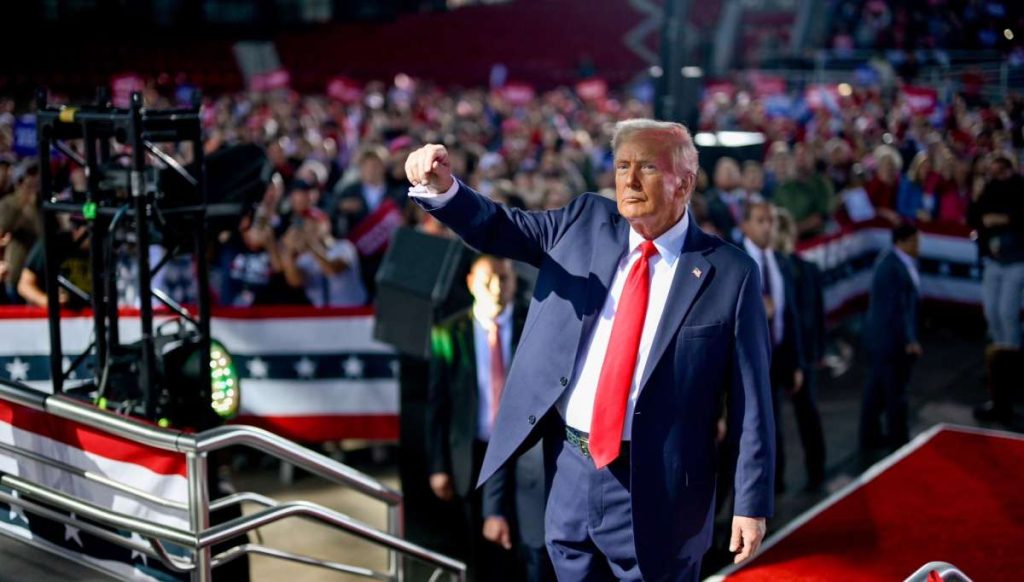Trump has said he wants to increase tariffs on goods imported from around the world by 10%, rising to 60% on goods from China, as part of his plan to protect US industries
Chancellor Rachel Reeves has said she is “confident” trade flows with the United States will continue under President-elect Donald Trump despite his proposal to put up tariffs.
The chancellor was asked what implications the result of the American election will have on her plans for growth as she faced questions from the Commons Treasury Committee.
Trump has said that, when he becomes US president again, he will impose a 60% tariff on Chinese goods and a 10% tariff on goods from all other countries.
The National Institute of Economic and Social Research (NIESR) says UK growth could be halved as a result. And Goldman Sachs has reduced its growth forecast for the UK next year following Trump’s election.
It was put to her that investment banking company Goldman Sachs has downgraded its forecast for the UK’s economic growth next year from 1.6 to 1.4%, while EU officials are anticipating a reduction in exports to the US of €150bn (£125bn).
Asked if she agreed with the Goldman Sachs forecast saying growth next year will be 1.4% not 1.6%, Reeves replied: “I think it is too early to start making changes to forecasts for our economy because of the election of a president in the United States. But I would say this, our trading relationship, our economic relationship with the United States, is absolutely crucial. The US are our single biggest trading partner.”
Reeves said that in Trump’s first term “we continued to have a strong and healthy economic relationship” with the US. And she went on, “We’re not just a passive actor in this. It’s a trade relationship with the United States and we will make strong representations about the importance of free and open trade, not just between ourselves and the United States, but globally. The US also benefits from that access to free and open trade with us and other countries around the world, and it’s what makes us richer as societies, to benefit from that open trade.”

Asked by John Glen, a Conservative former Treasury minister, if it was realistic to seek to influence Trump, Reeves said, “We’ve got another couple of months before the inauguration. Obviously, we will begin those conversations. We’ll prepare for different eventualities. I absolutely do not want to sound in any way sanguine. On the other hand, I am optimistic about our ability to shape the global economic agenda, as we have under successive governments.:
A tariff is a tax on imports or exports of goods between countries and is used to encourage or safeguard domestic industry.
Trump has said he wants to increase tariffs on goods imported from around the world by 10%, rising to 60% on goods from China, as part of his plan to protect US industries.
Trump’s victory in the US presidential election over Democratic opponent Kamala Harris has drawn a mixed reaction in the UK.
Prime Minister Keir Starmer and Conservative leader Kemi Badenoch have both congratulated him on the “impressive” result and vowed to work closely with him.
However, Liberal Democrat leader Ed Davey said it was a “dark, dark day for people around the globe” as he called Mr Trump a “dangerous destructive demagogue”.
Trump’s victory was confirmed when he surpassed 270 electoral college votes by winning Wisconsin, and he remains on course to claim all seven swing states.
It said that the impact of the global tariffs would be inflationary, pushing up prices by between two and three percentage points, while the Bank of England would be forced to keep interest rates higher.
This in turn would push up the cost of government borrowing, damaging both public and private sector investment. The Centre for Inclusive Trade Policy (CIPT) said that, if Trump’s policies were implemented, total UK goods and services exports to the US could fall by between £19 billion and £34 billion. At its highest level this would represent a 4 per cent drop in total UK global exports.
Alan Winters, emeritus economics professor at the University of Sussex, warned Trump’s tariff policies could create a global “tit for tat” tariff war Alan Winters, emeritus economics professor at the University of Sussex and founder of the CIPT, said while domestic pressure might mean such tariffs were not “inevitable” there was little sign that Trump would heed the economic warnings.
“You have to remember that the primary objective here is to restore manufacturing jobs to the US,” he said. “And fear of the consequences, from past experience, won’t energise him much.”
Winters added that the greatest danger was a global “tit for tat” tariff war in which countries sought to protect their own domestic industries by putting up barriers to imports. “That would be very damaging to the global economy,” he said.
Since Trump’s re-election, US and European bond markets moved in opposite directions as investors bet that tariffs would hit growth in Europe at the same time as Trump’s economic package boosts the US economy.
The yield on the 10-year Treasury traded 0.15 percentage points higher at 4.44 per cent, its highest level since July, while the yield on German Bunds fell 0.03 percentage points to 2.40 per cent.
ALSO READ: Trump Vows Deeper Ties with India Ahead














